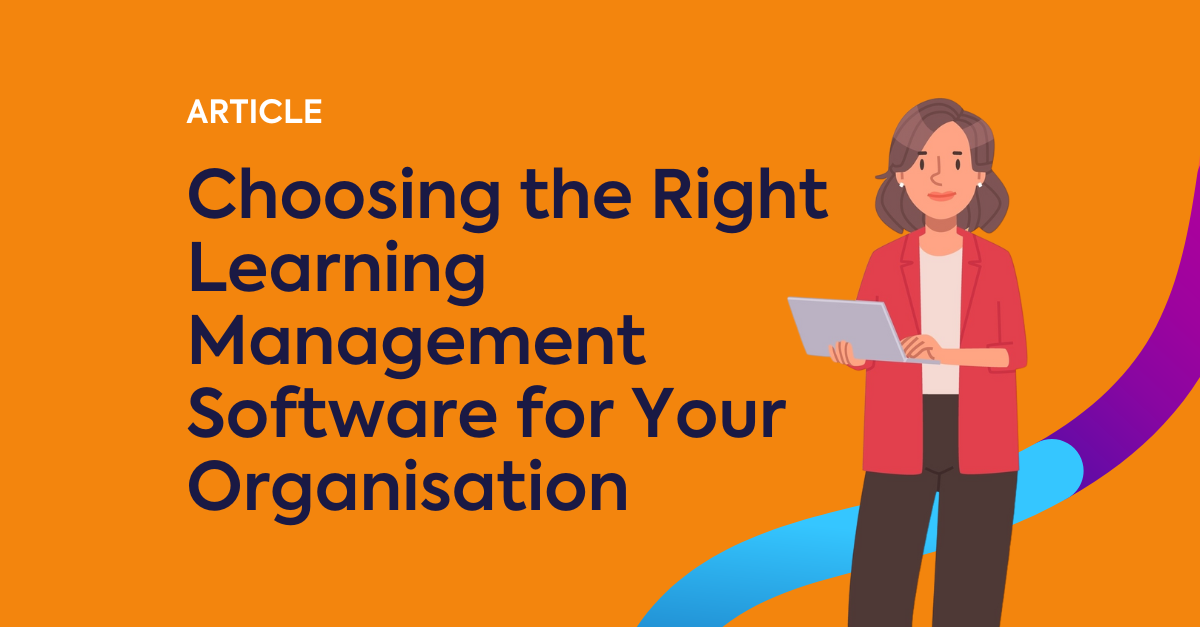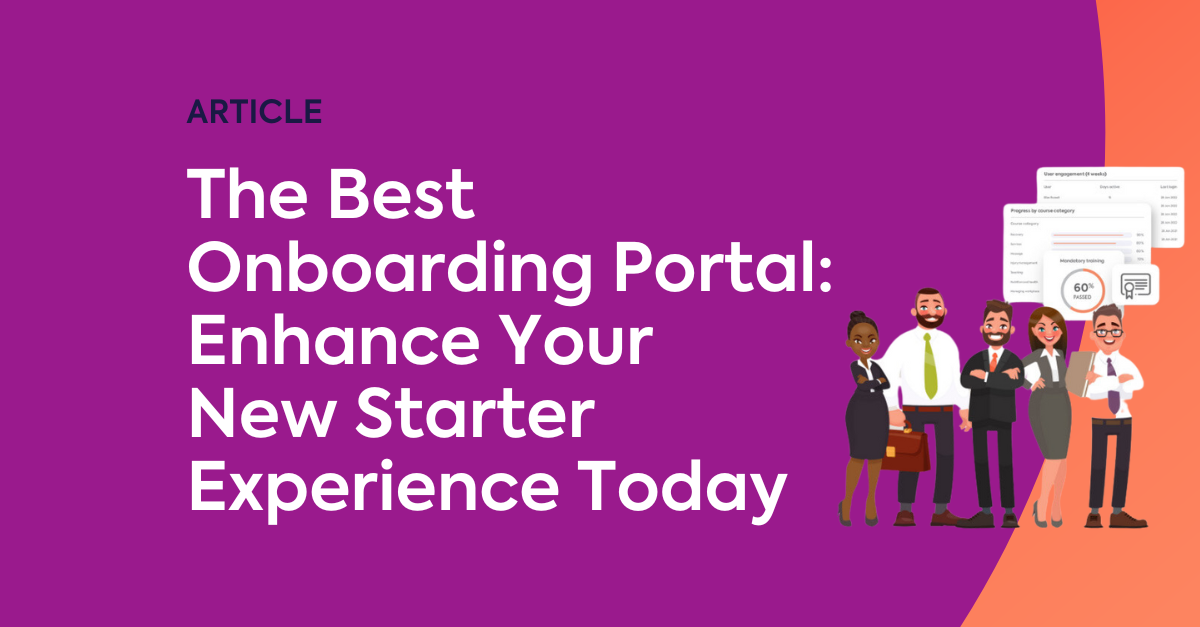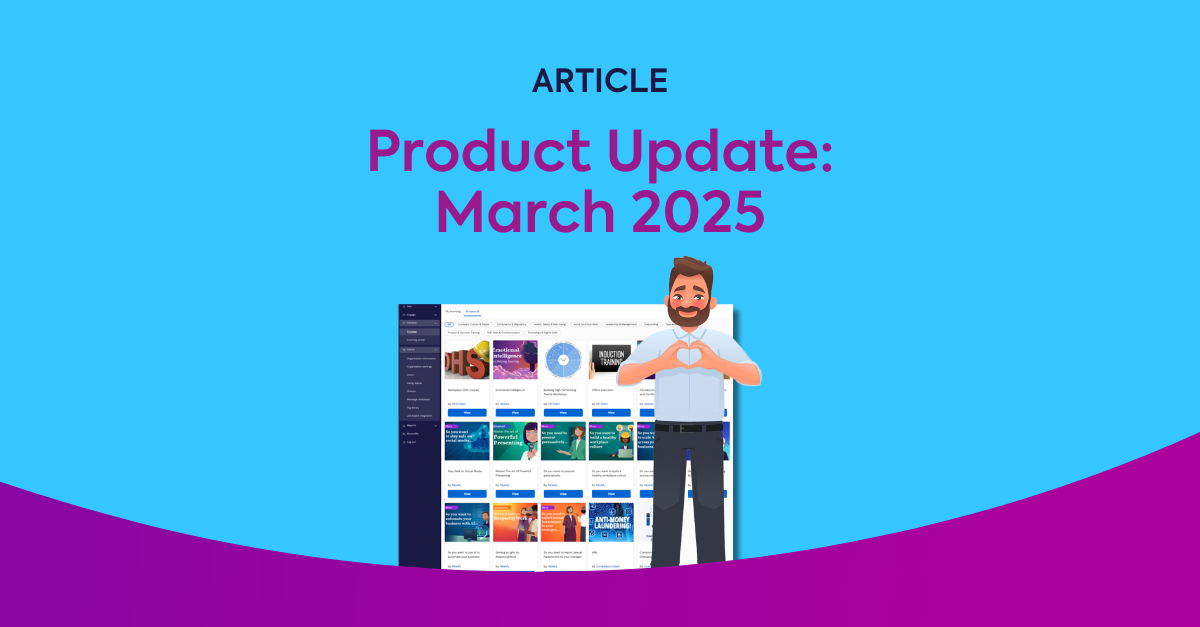Choosing the Right Learning Management Software for Your Organisation
Picking an LMS isn’t just another software decision—it’s about setting your team up for success. The right platform should fit seamlessly into your...
Engage
|
Hire
|
Develop
|
Assure
|
|
Deeply understand your organisation with science-backed analytics on your culture, team design, and engagement. |
Automatically match to candidates who are a great fit for your team culture and who are intrinsically motivated to succeed. |
Back your onboarding, compliance and skill development with industry-leading credentialling, competency and capability expertise.
|
Reimagine skills assessment and certification with dedicated tools designed to elevate your competency frameworks.
|
.png?width=383&height=200&name=team%20(1).png)
5 min read
 Mathan Allington
Mar 27, 2025 5:31:58 PM
Mathan Allington
Mar 27, 2025 5:31:58 PM

In today’s fast-paced, digitally-driven business world, companies are increasingly adopting Learning Management Systems (LMS) to streamline employee development via a data-driven approach. Far from just a tool for delivering learning programs, an LMS has become a strategic platform that aligns workforce learning with broader organisational goals. As business needs continue to evolve, so too must the capabilities of the LMS.
With the rise of remote workforces and hybrid learning environments, there is now a wide range in the way employees learn and develop. To remain competitive, businesses require an LMS that not only addresses current learning needs but is also adaptable to future challenges, can provide personalised learning experiences and supports continuous learning for the individual learner. In this blog, we’ll explore the key trends, challenges and innovations shaping the LMS landscape, offering valuable insights for businesses looking to navigate this rapidly evolving space.
As organisations adapt to a rapidly changing global workforce, the way they think about training and development has shifted dramatically. Learning management is no longer just about meeting compliance requirements or filling knowledge gaps; it's now about creating a more agile, engaged and skilled workforce through relevant and educational courses.
Businesses are realising that professional development is integral to employee satisfaction, retention and organisational growth. In a competitive talent market, providing continuous, relevant learning opportunities is key to retaining top talent. Additionally, with the rise of hybrid and remote work, there’s a growing need for LMS solutions that allow online learning to be delivered anywhere, at any time and on any device.
With this shift away from traditional classroom settings, organisations are looking for LMS platforms that can seamlessly integrate with their business objectives, provide flexibility for varying learning styles and offer an engaging learning journey.

The LMS landscape is being transformed by several key trends that are shaping how organisations approach learning and development. Here are some of the most notable developments:
As businesses continue to redefine their approaches to workforce development, one essential capability is the ability to assess practical skills and competencies where they matter most—on the job site. While many LMS solutions focus heavily on digital course delivery, some like Compono Develop stands out by enabling in-person assessments conducted by supervisors and team leads. This approach goes beyond computer-based modules, giving organisations a clearer, real-time view of an employee’s actual performance and readiness to handle day-to-day tasks. By incorporating workplace assessments, companies can ensure that training remains highly relevant, bridging the gap between theoretical understanding and hands-on proficiency.
In addition to in-person assessments, LMSs should be able to support a range of other capabilities that enable businesses to deliver targeted learning experiences aligned with real-world needs. From flexible online modules to engaging course design features, platforms need to be able to offer the necessary tools to accommodate diverse learning styles and schedules. Through comprehensive analytics, admin teams can measure employee progress and identify areas for additional support—whether it’s delivered virtually or on-site. Compono Develop, for example, integrates in-person evaluations with digital learning, equipping organisations with a robust, all-encompassing solution that fosters a culture of growth, proficiency and continual improvement.

In the modern learning landscape, an LMS is no longer just a tool for corporate learning —it’s an integral part of a company’s strategic framework. An LMS that is aligned with a company’s overall business goals can help drive performance, increase employee engagement and support the achievement of key organisational objectives.
For example, a company looking to improve compliance can use its LMS to automate certification tracking, manage training schedules and ensure employees remain up to date with industry regulations. Similarly, organisations focused on leadership development can use an LMS to create tailored learning paths for high-potential employees, ensuring that they receive the training and resources needed to succeed in future roles.
As businesses increasingly focus on upskilling and reskilling their workforce, the ability of an LMS to adapt to changing needs and align with evolving business priorities becomes even more crucial.

Looking ahead, the future of the LMS space is shaped by continued innovation in AI, mobile learning and integration with other business systems. Here are some of the key trends expected to define the next phase of the LMS evolution:
The Learning Management System landscape is evolving rapidly, driven by the need for more personalised, flexible and engaging learning experiences. As businesses increasingly recognise the strategic value of continuous employee development, LMS platforms are becoming indispensable tools in helping them meet their objectives.
To stay competitive, organisations must embrace the latest trends in the digital learning landscape and choose platforms that align with their long-term business strategies. Understanding the evolving LMS landscape is crucial for businesses looking to harness the full potential of their learning initiatives.
At Compono, we understand the challenges businesses face in navigating this ever-changing landscape. Our LMS platform, Compono Develop, is a powerful tool designed to meet the evolving needs of businesses, offering a robust, scalable and flexible solution to support your learning and development strategy. With a focus on alignment, engagement, and data-driven insights, we provide the tools businesses need to thrive in the modern learning environment.
No longer sure about the suitability of your current LMS? Use our LMS Scorecard today to fully assess its performance, and alignment with your business.
Build your own or bring your own, we've got your learning and development management covered. 🌟


Picking an LMS isn’t just another software decision—it’s about setting your team up for success. The right platform should fit seamlessly into your...

The article focuses on the essential functions and concepts within Human Resources (HR) critical for fostering a productive work environment. It...

What is an employee onboarding portal? An employee onboarding portal is a centralised digital platform designed to simplify and streamline the...

Gulping Geese and Good Learning Instructional design is the complex interplay between the instructor, the learner, and the medium that supports...

Follow our monthly product updates as we share the latest features to help you strategically design and develop teams and the work environment.

Overview Mastering attrition risk requires the implementation of essential strategies that enhance employee engagement, acknowledge contributions,...